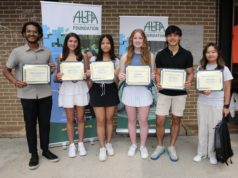When we think of spring and summer, we welcome lazy, long sunny days, walks on the beach, outdoor concert series and live sporting events, and vacations with our family. Well, this year proved to be beyond what anyone could foresee, predict or imagine. Many of us had to get creative to come up with activities to keep our kids busy. We had to home school, learn to cook, find a new hobby, and just try to create as normal a life as we had been used to living this time of year.
We saw communities come together, working to help each other. Many could not continue to play tennis or enjoy other social activities, so we came up with ways to fill our days during a difficult time.
We want to share some of these stories from our ALTA members and how they managed to keep it all together:
Ben Hestley, Tennis Director at Druid Hills Golf Club
As a tennis coach and someone who manages other coaches, my reflection time during all this was naturally spent on how we coach. Not necessarily the “COVID stuff,” although I did spend a considerable amount to time tackling that daunting task, but how coaches develop players, and more specifically, how do we make the learning “stick.” I had been doing some coach development of my own and dabbling in this notion of push vs. pull; pulling information from the student to guide them to the answer, instead of pushing them the information in expectation for them to remember.
As this epidemic hit, suddenly I was an elementary school teacher and got to practice this concept on my own children, and in a setting completely different than giving a lesson on a tennis court. Some days were good, and some, well, hopefully one day we can laugh about, but it was absolutely rewarding to be so involved in my children’s education. With some assignments, I certainly “pushed” to get the job done, but constantly reflected on this question: I could just give them the answer, but is that best for long-term learning? The long way home is often the most scenic.
Prior to the pandemic, I was honored to be selected to serve on USTA’s ADM Task Force. ADM stands for American Development Model. Typically, we would have difficulty scheduling regular meetings, but quarantine gave us much time to meet virtually. Every Tuesday at 2:00 p.m., we coined “ADM Time!” For me, this was an important hour. Turn off all of the news buzz and have discussions with great minds of our sport on developmentally appropriate coaching, athlete-centered coaching, and championing multi-sport participation.
As most did, we got to spend a lot of time together as a family. It was remarkable to see my two children, eight-year-old boy and four-year-old girl, bond as siblings and really become good friends; something that hadn’t always been the case given their age and gender difference. Without a doubt, my favorite thing during this pandemic was watching a movie with my family every night. From mid-March until now, the four of us watched a movie every single night after dinner, minus a day when the kids got too unruly, so canceling movie night was the punishment.
I kept hearing “there’s no playbook for this.” Well, that could be true for life. Of course, you could copy someone else’s playbook, but the playbook you dial up to deal with COVID-19 must be authentic to you; otherwise it won’t work. I realized every little thing is of the utmost importance, not just in navigating pandemic plans but in handling life. In trying to reopen the club for tennis, every move we made had to be carefully calculated. We were not trying to make the “right” decision, but rather the best decision. The best decision for us was not a copy-cat of what another club was doing and certainly not trying to “one up” our neighbors in attempt to “win the COVID race.”
Getting players back on the tennis courts is not a race; it’s a timeless process. This could be a microcosm of life decisions moving forward. We don’t know what tomorrow will bring, but we do know that what we do today is going to help us deal with tomorrow.
Rebecca Johnson, Sceney tennis pro at Crooked Creek in Milton
I started an initiative to collect handmade cards for people on the frontlines of the COVID pandemic. One of our community residents, Lori Ovington, is the House Coordinator at Northside Hospital in Forsyth. Our juniors (and even some of the adults and tennis pros) made “Thank You” cards to distribute among the hospital staff. Lori made sure that these cards made it into the hands of the often unrecognized employees, such as custodians, lab techs, and front desk staff.
Players also made “Get Well” cards and wrote down inspirational messages for those who were in the hospital, whether for COVID-related illness or not. Patients were unable to have visitors at a time when they probably needed comfort the most. Many of our juniors got their scout troops, neighbors, and siblings involved in the card making. All in all, we collected about 50 homemade cards. I was really proud of everyone who took the time to contribute!
ALTA member Cheryl Smith
While many people we know spent their time during this quarantine walking and jogging, cleaning house, getting rid of closet clutter, and missing tennis, others turned their attention to the greater good. Many with great sewing skills decided to make masks for our dedicated healthcare workers. One such ALTA member from Stockbridge is Cheryl Smith, who spent countless hours helping those on the frontlines and contributing her skills for masks that were donated through smahhenry.org.




